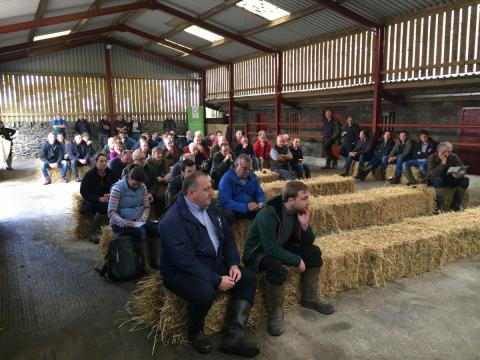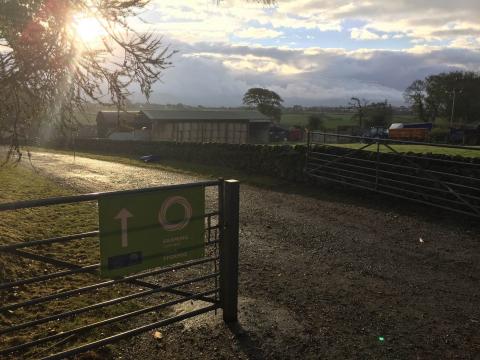The importance of nutrition for both beef finishing enterprises and to boost sheep flock productivity was highlighted at an open day at a Farming Connect Demonstration Farm.
At Plas Farm, Anglesey, Hefin Richards, of Profeed Nutrition Consultancy outlined how targeting rations during the growing and finishing phase and spending more money on better quality feed for beef cattle can actually help cut overall costs and increase profit margins. Vet Kate Hovers highlighted how getting ewes in good condition with the right feed has a positive impact on fertility and colostrum quality, benefitting lamb productivity.
Mr Richards explained that during the growth phase, farmers can save up to 10p a day by feeding cattle a ration based on higher quality silage of 11ME. Growing animals should have a target growth rate of 1kg a day, with a diet high in protein and fibre but low in starch to encourage growth of the animal’s frame.
“With better quality silage the protein and energy levels are higher, so the animal can rely more on the forage in the ration and less on bought-in feeds,” said Mr Richards.
When cattle are being fattened, target growth is 1.5kg a day, feeding high energy, high starch rations with enough fibre to maintain good rumen health. Targets for finishing should be 50-80 days and feeds that are high in dry matter are important at this stage to maximise feed efficiency.
“A good quality ration enhances the animals feed conversion to meat ratio (feed efficiency), therefor producing more meat from less input and cost” added Mr Richards.
A ration that cost £.150 per head per day had a margin of £52.50, however a ration costing £1.90 per head per day had a margin of £92 because the animal had better DLWG from the better ration and took 30 days less to finish for slaughter.
At Plas Farm Arwyn Jones finishes 600-700 cattle a year. All are bought in as stores aged between 18-22 months old and are fed a grass silage-based ration, which is supplemented with home-grown cereals and bought-in protein.
Arwyn also has a flock of 1,100 Suffolk cross ewes and 350 mule type ewes. Ewes start lambing in the middle of January, with ewe lambs lambing from mid-March onwards. During the next lambing season a Farming Connect project will look to reduce the use of antibiotics at lambing time.
The project will focus on ewe and lamb health, specifically colostrum quality and intake, in order to cut routine use of antibiotics. Independent vet Kate Hovers will work with Arwyn on the project. She said: “Mass medication to prevent disease is not really sustainable. We need to try to prevent disease in the first place through better management.”
Colostrum contains antibodies that help prevent infection and sufficient intake in the first few hours after birth can kick start performance, leading to heavier weaning weights and fewer days to finishing. As part of the project, nutrition will be analysed and metabolic profiles of the ewes created.
“The profiles are really useful to do about two to three weeks before lambing as it gives a guide on whether the ewe is getting enough energy and protein to produce quality colostrum. This gives enough time to tweak things if needed.”
Blood samples taken from lambs at two to five days to monitor colostrum absorption and no routine antibiotics will be administered to singles and possible good twins. Colostrum absorption levels will be compared, along with growth and weaning rates.
Kate also discussed ewe management in early and mid-pregnancy, highlighting feeding regimes, trace element deficiencies, treating lameness and fluke and the importance of body condition scoring.
For more information about the projects taking place across the Farming Connect Demonstration Network, click here.


